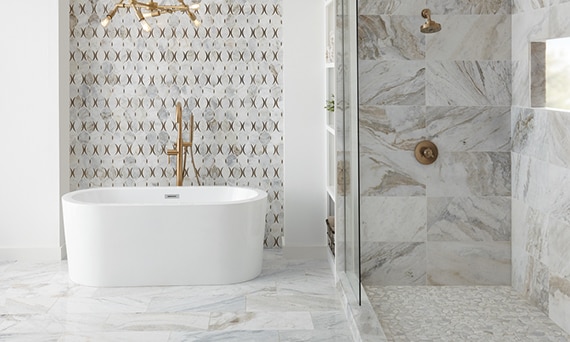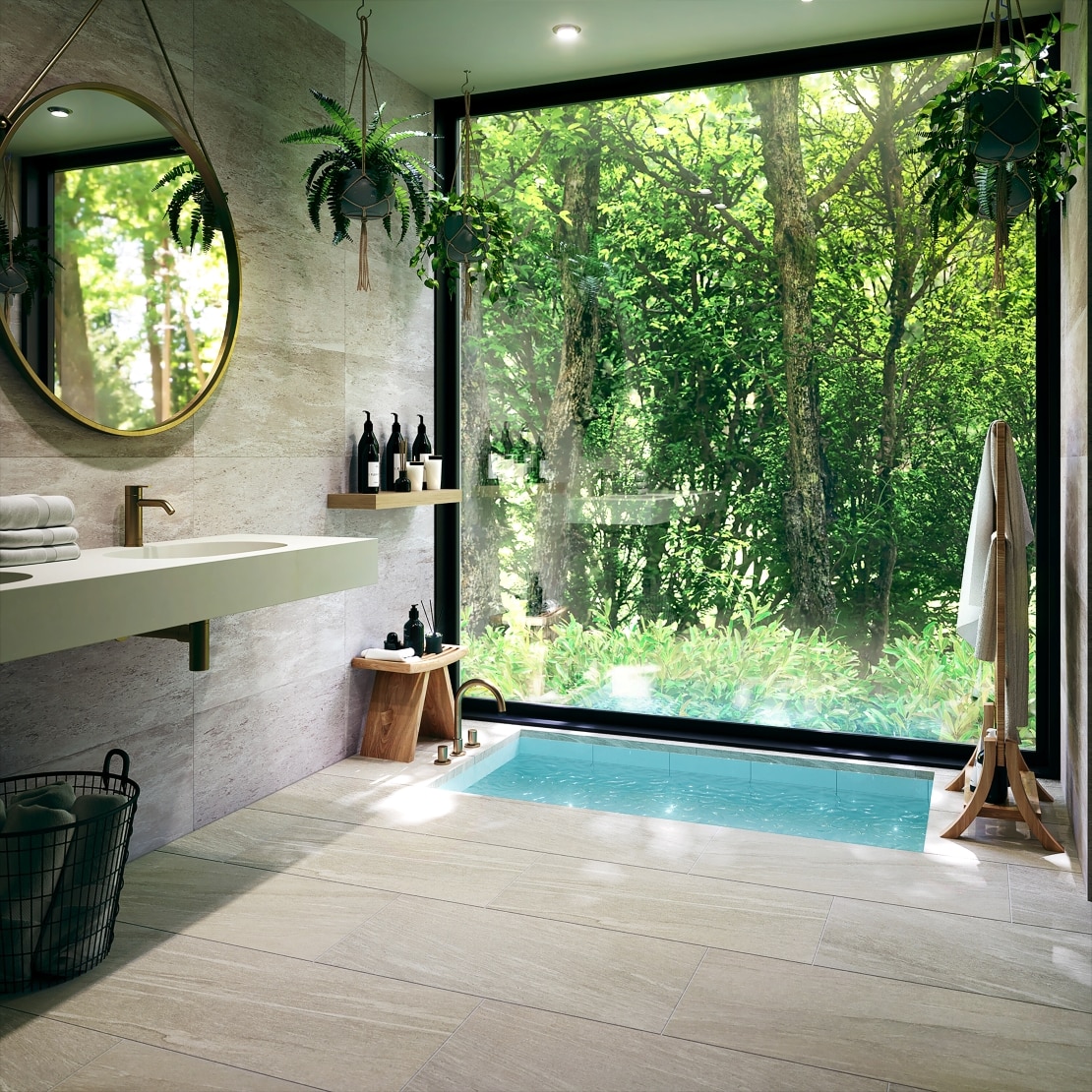
Caring For & Maintaining Natural Stone
Read below for helpful instructions and tips on how to best clean and maintain marble, granite, limestone, travertine, and soapstone flooring and countertops.
ROUTINE CARE
Natural stone countertops and floors should be cleaned with neutral cleaners specifically designed for stone. These cleaners are concentrated pH neutral cleaners that will not affect existing sealers or other types of coatings. Stone cleaners should never contain acid or bleach. Acids, even a light solution of vinegar and water, will etch and eventually damage many varieties of natural stone. A solution of the pH neutral cleaner and water mixed to manufacturer instructions should be applied to the stone surface with a sponge or spray bottle. Allow solution to sit per manufacturer recommended specified amount of time to ensure penetration of the stone. Agitate with a sponge, or soft bristle brush. Remove dirty solution with clean sponge and buff dry. Some textured stones may require a different cleaning method or additional procedures not specified here.HEAVY-DUTY STONE CLEANING
If stone needs a deep clean, you will need to use a heavy-duty stone cleaner and degreaser to effectively remove dirt, grease, grime, waxes, etc.These cleaning products are concentrated and designed to deep clean the stone without damaging it. Apply the solution per manufacturer instructions to the stone surface with a sponge. Allow to stand for the manufacturer-specified amount of time.
Agitate with a sponge or soft bristle brush. Remove dirty solution with a clean sponge and buff dry. Be sure to change out the cleaning solution every 100 square feet to avoid reintroducing dirty water during the cleaning process. Rinse thoroughly with clean water when finished. Make sure to always limit the time liquids sit on any type of natural stone and dry the surface thoroughly.
STAIN REMOVAL
A stone specific poultice can be used to remove stains and grout haze from stone. Poultice is a fine, non-acidic, absorptive clay cleaning powder that removes stains and light cementitious grout haze from polished and unpolished natural stone. Stone poultice efficacy depends on the nature of the stain and how long the stain has been in the stone. Base the selection of the type of poultice on the nature of the stain. If the stain is old or has penetrated the stone deeply, a poultice may not be enough to remove it. Spills should always be cleaned up as soon as possible. Light colored marble and nearly all limestone are subject to staining. Spills on such materials should be cleaned up immediately to prevent staining.
CAUTION: Poultice may dull the shine of the polished stone. If this occurs, you will need to use a stone polish to restore the natural shine.
RESTORATION
If your natural stone has been damaged or is worn, we recommend that you contact a professional stone restoration company.
SEALING
Sealing is strongly recommended for all stone, especially newly installed marble, granite, and limestone to provide maximum stain protection. Be careful to select a high-quality sealer to protect your natural stone. Newly installed natural stone countertops are often sealed at the time of installation by the fabricator. Please check with your fabricator regarding their standard sealing regimen. Sealing every couple of years (see manufacturer's directions) will ensure your stone continues to look its best.
Types of Sealing Products
There are two categories of sealing products: penetrating/impregnating and stone enhancer.Penetrating/impregnating stone sealers are a no-sheen, natural look sealer that can be water-based or solvent-based, and are good for interior and exterior applications. Most quality sealers of this type are rated to protect the stone for several years. A premium natural look penetrating/impregnating sealer is the standard choice on polished or honed natural stone countertops.
Stone enhancer sealers are also a no-sheen, penetrating/impregnating sealer that is formulated to darken, enrich, and highlight the natural color and beauty of stone products. They will rejuvenate and improve the appearance of worn and weathered stone. However, they will also darken the color of seams and joints. They are, generally, suitable for interior and exterior use, and rated to protect the stone for several years.
Always reference manufacturers’ literature for specific information on the duration of the sealer’s protection and make sure that the sealer is applied in strict accordance with the manufacturer’s instructions.
ACID SENSITIVITY
The use of natural stones in environments where acid exposure likely requires a proper stone selection to avoid etching. Most notably, the calcium carbonate and calcite-based stones (marble and limestone primarily) will react to relatively mild acids, such as lemon juice, vinegar, and sliced tomatoes. The result is not a stain, which could be removed, but an etching of the stone surface, which cannot be removed without refinishing the stone. In polished finish stones, a mild acid attack will usually manifest itself as a “dull” spot within the surrounding glossy surface. LOT SPECIFIC ISSUES
Stone tile and countertops are products of nature and are inherently subject to the variability of any product harvested from nature. Select adequate quantities of a product in the beginning of a project as it can be very difficult to buy stone later that matches an initial purchase. We recommend customers purchase a 10% overage.
TRANSLUCENCE
Translucence may occur in some white or very lightly colored marbles and onyxes that have a crystal structure that will transmit light to varying degrees depending upon stone thickness and finish. Translucence can be an aesthetically intriguing, decorative attribute and is not considered a defect.
MIXING TYPES OF MATERIALS
Designs calling for a mixture of stones with different physical properties, while aesthetically interesting, can give rise to problems of wear and maintenance, especially in outdoor applications. Re-polishing will pose problems as well. The customer should be aware that mixing types of stones means there will be different application limitations, abrasion resistance levels, and different densities of stones that must be considered in the long-term maintenance of the stone and its wearability. Take a closer look at natural stone flooring and countertops at your local showroom.
DISCLAIMER
CARE AND MAINTENANCE GUIDE
American Olean does not manufacture installation products or countertop cleaning/maintenance products. American Olean provides the information on this page to its customers as an information source only. Please contact an installation product manufacturer directly, PRIOR to usage, to obtain proper handling instructions, application instruction and warnings concerning potential health hazards for any product contemplated for use.
To ensure your natural stone products will provide you with a lifetime of beauty and utility, proper maintenance is crucial. Natural stone products are porous by nature and require a different maintenance program than traditional ceramic tile. American Oleanalso strongly recommends testing a small area PRIOR to usage of any installation/countertop cleaning/maintenance product to determine whether the product serves its intended purpose.
SAFETY PRECAUTION TO CUSTOMERS
The products described in this document may have chemicals that cause reactions in certain individuals. American Oleanstrongly recommends the use of safety glasses, respirators (masks) and gloves in handling any materials that contain chemicals. American Olean recommends the proper disposal of any scrap tile/stone, installation and/or maintenance products discussed herein.
Natural stone has unique qualities that not only distinguish it from man-made materials, but also should be considered in selecting it for a particular project. Stone is not manufactured; it is a product of nature. Blocks are removed from the quarry, slabs are cut from these blocks, and the slabs are further fabricated into the final stone to be installed. Each block is different; each slab is different. Skillful blending or matching of the dimension stone blocks, veneer panels, tops, etc., results in a beautiful blending of nature’s variety and man’s design. “Uniformity of material,” when applied to natural stone, is a term of relative value that needs to be understood when making a selection.





